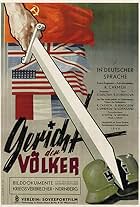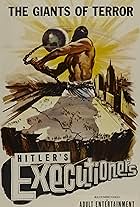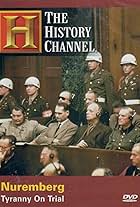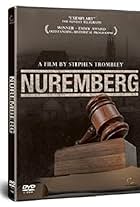Advanced search
- TITLES
- NAMES
- COLLABORATIONS
Search filters
Enter full date
to
or just enter yyyy, or yyyy-mm below
to
to
to
Exclude
Only includes titles with the selected topics
to
In minutes
to
1-50 of 64
- The dramatized account of the war crime trials following the defeat of Nazi Germany in World War II.
- Adolf Hitler, born in Braunau, a man who will forever change the history of the world.
- The Nuremberg Einsatzgruppen trial of 1947/1948 is considered the largest murder trial in history against members of four death squads from the security police and SD (the security service of the SS). During World War II, six million Jews were murdered. Four million died in the extermination camps, but two million people were killed in systematic mass shootings. A fact that is hardly known today. The perpetrators came face to face with their victims. They shot at men, women, children - day after day, obediently and assiduously, as if it were normal work. Tens of thousands of Germans belonged to the mobile commandos of the task forces and police battalions. Who were these men, how could they commit such murders? What did the few survivors tell, how were they able to escape the mass extinction and live on with the horrific experience? Based on written traditions, original documents, film footage and photos as well as expert statements, the documentary traces the path of one of these murder battalions.
- Life in Berlin in 1945 before, during and after the battle of Berlin seen through the eyes of those who were there at the time from common Berliners to Allied troops.
- Explores the subject of atrocities during wartime, especially during World War II and the Vietnam War.
- Profiles on the major defendants of the Nuremberg war crimes trials.
- A look at the trials of Nazi leaders.
- An examination of the architect Albert Speer's role in Nazi Germany, his trial at Nuremberg and conviction for war crimes, despite his claims of ignorance of the Holocaust.
- The Nuremberg trials, 1946 Goering and the Nazi high command stand trial. Within the prison a dangerous mind game is being conducted by Goering and the prison guards who stand watch over the perpetrators of the Holocaust.
- Documentary with recordings from the Nuremberg war crimes trials.
- The rise and fall of Nazi Germany in part through the use of classical allegory.
- The end of the Second World War in Europe, and the aftermath: war criminals to be brought to trial, stolen art treasures to be returned to their rightful owners.
- An examination of the historic Nazi trials at Nuremberg.
- Based on the 1947 book "I.G. Farben", by American author Richard Sasuly, and records from the Nuremberg Trial of the chemical giant I.G. Farben, Council of the Gods is a story about the collaboration between international corporations and German scientists, whose research contributed to the death of millions. Featuring music by Hanns Eisler, electronic sound by Oskar Sala (Hitchcocks's "The Birds") and a script by Friedrich Wolf, the film is powerful in its depiction of the moral dilemmas and lessons of the war, as well as of Cold War propaganda. Chemist Dr. Hans Scholz lives through a tortuous political transformation and maturation process. Finally, he becomes wrapped up in his political neutrality and closes his eyes to the fact that poison is being produced in his factory. Standing before the judges at the Nuremberg trials he has to face the fact that he was partly responsible for the deaths of millions in the gas chambers of the extermination camps.
- 'notes to eternity' is a meditation on the Israel-Palestine conflict centering on the lives and ideas of four renowned critics of Israeli policy: Noam Chomsky, Sara Roy, Norman Finkelstein and Robert Fisk.
- Human torture. Factories of death. War atrocities. The crimes that haunt the pages of history are chronicled in the piercing documentary Camps of Death. Following Hitler's murderous career, the film traces his rise to power, his ultimate demise, and the subsequent Nuremberg trials that publicized the horrors of Hitler's regime. Concentration camp footage combines with chilling POW interviews to graphically create the Nazi nightmare that few could hope to survive.
- Documentary about the major events of the first fifty years of the Twentieth Century.
- From the perspective of the Auschwitz-Birkenau State Museum, documentary material, amongst this the freeing of the camp and the Nuremberg Trials with clips from films which were produced shortly after the war, and pictures of museum visitors are assembled into an essay about memory.
- The story of Howard Triest, a German Jew who fled Nazi Germany in 1939 when he was 16 years old, returned as a victorious American soldier and then served as an interpreter at the Nuremberg Tribunal.
- What is the fate of the children of famous Nazi criminals? What does it mean to be in captivity of your names? And what is it like to live knowing that on the hands of your ancestors is the blood of thousands, millions of innocent lives?
- A motivational drama about the first candidate for the newly formed Anti-Corruption Court who returns to Ukraine, known as the most corrupt continental state in Europe, to probe himself and the system by participating in the contest.




















